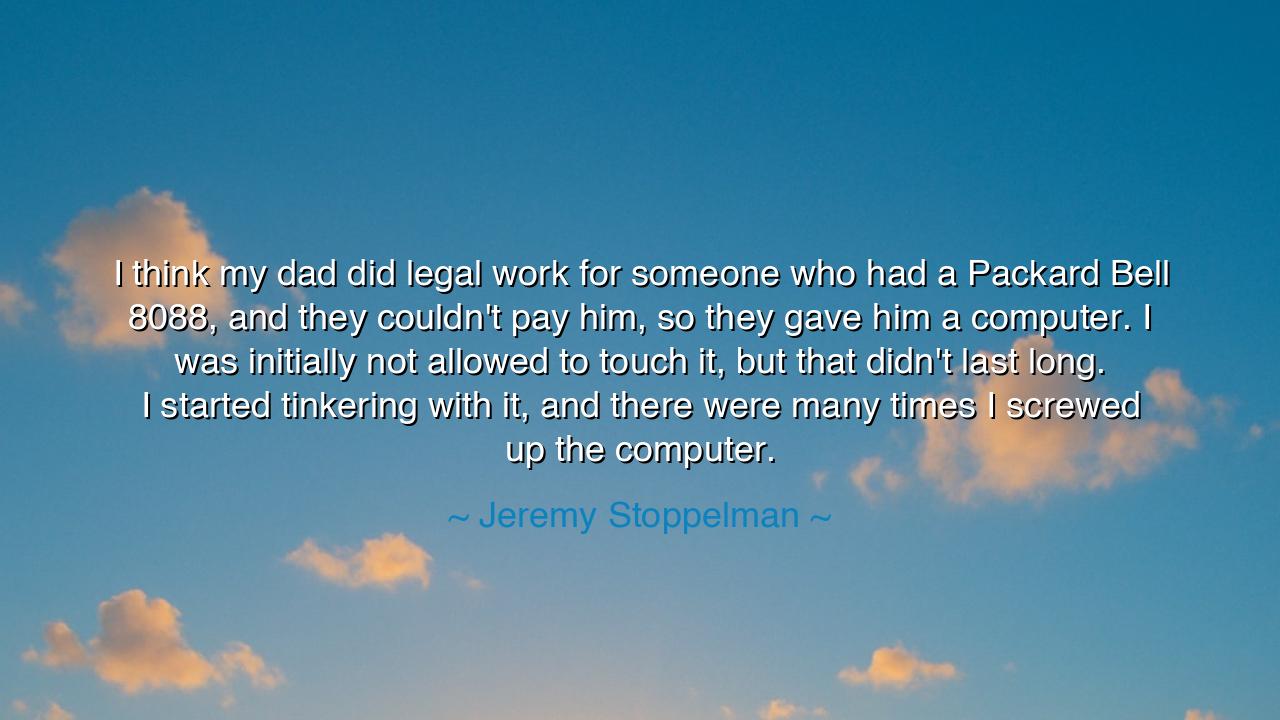
I think my dad did legal work for someone who had a Packard Bell
I think my dad did legal work for someone who had a Packard Bell 8088, and they couldn't pay him, so they gave him a computer. I was initially not allowed to touch it, but that didn't last long. I started tinkering with it, and there were many times I screwed up the computer.






When Jeremy Stoppelman said, “I think my dad did legal work for someone who had a Packard Bell 8088, and they couldn't pay him, so they gave him a computer. I was initially not allowed to touch it, but that didn't last long. I started tinkering with it, and there were many times I screwed up the computer,” he was not merely recounting a childhood memory — he was describing the birth of curiosity, the spark that begins every journey of creation. In these humble lines lies a universal story: how passion is born not from perfection, but from failure, forbidden desire, and the courage to explore the unknown. Stoppelman, who would later become the co-founder of Yelp, speaks with the quiet wonder of one who has seen the power of curiosity transform error into genius.
The origin of this quote rests in the early days of personal computing, when the world was just beginning to awaken to the strange magic of machines that could think in numbers and words. The Packard Bell 8088, a modest home computer by today’s standards, became young Jeremy’s teacher. It arrived not through wealth or design, but by chance — a barter between his father’s legal work and another man’s debt. It was a gift of circumstance, an accident of fate that would change the course of his life. His parents’ rule that he was “not allowed to touch it” speaks to the natural fear of breaking what one does not yet understand — a fear that every pioneer must overcome. For the path to mastery begins with the rebellion of curiosity.
When Stoppelman says, “I screwed up the computer,” he reveals something profound: that true learning begins at the edge of failure. Each mistake was not an end, but an initiation — a test of resilience. The ancients, too, knew this truth. Archimedes, Galileo, Leonardo — each one broke boundaries by first breaking convention. They failed, they erred, they defied. In the same spirit, young Jeremy’s tinkering, though chaotic, was guided by an unseen force: the hunger to understand. And that hunger, once awakened, becomes unstoppable. The boy who once “screwed up the computer” would one day help build digital communities that connected millions. Such is the alchemy of curiosity — it turns accidents into destinies.
The forbidden object — the computer he was not allowed to touch — becomes a symbol of every boundary that awakens human creativity. Throughout history, progress has been born in the tension between prohibition and desire. When Prometheus stole fire from the gods, he did what was forbidden, and humanity received light. When Stoppelman reached for that machine, he was performing the same act in miniature — taking the “fire” of technology and making it his own. Every generation must touch what it has been told not to, must disobey the limits of comfort to uncover the truth that lies beyond. For innovation is disobedience sanctified by purpose.
There is also humility in his words. Stoppelman does not romanticize his beginnings; he remembers the errors, the confusion, the failures. He honors them. This humility is the mark of wisdom — for he knows that the computer did not yield its secrets easily, and that each mistake was a lesson disguised as disaster. In an age that glorifies instant success, his story stands as a reminder that mastery is forged in frustration, and that the road to understanding is littered with errors bravely made. The young tinkerer learned not just how a machine worked, but how the mind itself learns — through trial, curiosity, and the patience to begin again.
From his recollection, we can draw a timeless truth: the greatest teachers are not those who prevent mistakes, but those who allow them. Parents, leaders, and mentors must remember that growth cannot occur in the absence of risk. To forbid curiosity is to stifle genius; to allow exploration, even messy and imperfect, is to give birth to discovery. The broken computer was not a failure — it was a seed. It broke, and in breaking, it taught.
So let this be the lesson to all who seek to create or understand: touch the forbidden, tinker with the unknown, and embrace your mistakes as sacred steps on the path to wisdom. Do not fear breaking what you love, for in rebuilding it, you will come to know both the thing and yourself more deeply. As Jeremy Stoppelman’s story reminds us, the instruments of destiny often arrive disguised as accidents — and those who dare to learn from their failures will one day shape the world with the same hands that once “screwed up the computer.”






AAdministratorAdministrator
Welcome, honored guests. Please leave a comment, we will respond soon